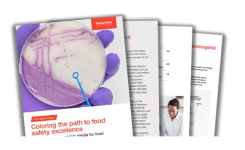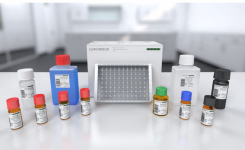Strategic Diagnostics Announces Results of Mad Cow Test Study
go back to news archives Strategic Diagnostics Inc. - a leading provider of antibody products and analytical test kits for the food safety and water quality markets, has announced the results of a comparison study performed by the Joint Research Centre (JRC) of the European Union, which included the Company's screening test for the detection of meat and bone meal in animal feed.
The major purpose of the study was to evaluate the proficiency of European laboratories to correctly classify feed samples containing different types of processed animal proteins and meat and bone meal at various concentrations. The performance of the most important methods, microscopy, polymerase chain reaction (PCR) and immunoassays were included in the study. The study findings demonstrated that the SDI test had 100% sensitivity, specificity and accuracy when analyzing for total processed animal proteins, and was the only immunoassay method to provide this level of performance. Importantly, the test successfully detected mammalian meat and bone meal (MMBM) at the lowest concentration tested, 0.1%, even when the samples had been processed at the higher temperatures and pressures used in the European Union. In their report, the JRC writes, "The main advantage of the applied immunoassays is the good sensitivity along with a capability of high sample throughput." The authors conclude that a potential model for testing for processed animal proteins could be based on screening immunoassays where positive samples are confirmed using methods like microscopy.
Dr. James W. Stave, Vice President of Research and Development and Chief Technology Officer of SDI, stated, "This study showed our method produces accurate, reliable and reproducible results. We demonstrated that rapid field tests can be used to screen cattle feed for compliance with feed regulations designed to prevent the spread of mad cow disease." The Company's test, known as FeedChek, was designed in a lateral flow format to be more sensitive and easier to use than labor-intensive, time- consuming and costly microscopic methods. Compared to certain competitive immunoassay products, this test does not require weighing or boiling of samples. By eliminating these steps, the FeedChek test is faster, easier to use and does not require equipment such as scales and heating devices. The method for animal feed has been designed with multiple tests per strip to address the various analytical requirements throughout the world. FeedChek is the only test available which provides results for both mammalian meat and bone meal and poultry meal. Poultry meal is currently prohibited from use in cattle feed in Europe. A number of industry experts have recently recommended exclusion of poultry products from ruminant feed in North America. These product features are important to comply with customer specifications and governmental regulations throughout the U.S., Europe and Japan. The test was developed in collaboration with Molecular Circuitry, Inc. and sponsored by McDonald's Corporation.
The transmission of mad cow disease is believed to be linked to the use of rendered meat and bone meal as a protein supplement in animal feed. Meat and bone meal made from cattle has been banned for use in cattle feed since 1997 in both Canada and the USA, but it can be used legally in feed for poultry, swine and household pets, none of which are known to contract mad cow disease.
Source : Strategic Diagnostics Inc. [USA]
Now part of Romer Labs, Inc. View Company Information
Posted on June 8, 2003
















